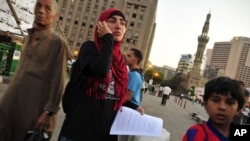There's no telling who you might meet on the street during a revolution.
February 4, 2011. The streets of Cairo were a tumult of anger, tear gas, fear and hope. Documentary filmmaker Micah Garen was in the middle of it all when, unbidden, a young Egyptian woman approached, holding a sign.
"Are you a journalist? Will you tell my story?", she asked. Garen agreed and began rolling tape. It would change both of their lives.
The woman, Shima'a Helmy, was a freelance writer and translator with a degree in bio-techology. She never considered herself politically active, much less participated in what looked like a rebellion before. But here she was.
"I knew about it online, but no-one knew what was going to happen," she says of the protests. "But then I was looking at how the Tunisians were able to overthrow Ben Ali. I was, like, 'We can do this.' So it was me and my brother and sister and all of us coming out to the streets."
A novice protester, Helmy felt bolstered by the mass of people around her, and began to tell her story to Garen on-camera in the middle of the riots. Very soon, however, the Egyptian police moved in, detaining both of them - and Garen's camera.
"It was one of those things where I had to take the flashcards [that record the footage] and throw them over a bridge while they were detaining us so they wouldn't have her and the footage," recounts Garen. "It was a bonding experience between us."
From that bonding moment a documentary movie was born. "IF" is a real-time record of the Egyptian revolution, told through the perspective of Helmy, among others. Still in production, co-producer Marie-Hélène Carleton calls it a tale in three acts: 'Revolution', 'After the Revolution', and 'What Happens Next?'
Carleton, Garen and Helmy are touring the U.S., talking about the film and the uncertainty of the situation in Egypt. Their travels have brought them to Camden, Maine; a salty resort-town between the rugged mountains and the ocean, and host of the annual "PopTech" conference.
"Technology is transformative," says a slim young man who identifies himself as "Marc", one of the hundreds of conference attendees. That social media has changed things is not a topic of debate here; how it has very much is.
One participant, the impish Thomas Thwaites, describes his journey to build a toaster from scratch - literally, even boiling down the material needed to make the fuel to make the material that makes the toaster - and how it relates to our online lives. Another speaker, Saudi scholar Hayat Sindi, eagerly describes how the web will be the tool to bring science, education and hope, to a new generation of unemployed Arabs.
But it's not all techno-love in Camden. No less a figure than Iceland's President Olafur Ragnar Grimsson kicked off the conference with brisk cold water to the face: "This so-called social media has transformed our democratic institutions," cautioned the white-haired Grimmson. "The White House or the presidency and the cabinet in my country has become almost a sideshow." Ouch.
The role of the Internet and social media in the Arab Spring has been a hot topic since Facebook began buzzing with talk of revolution in Tunisia, as it remains at PopTech. But it's still an unsettled question - not just among participants here, but even among the team behind "IF."
"In a place like Egypt, everyone is a filmmaker, everyone has a camera, everyone is communicating far more than I do," says Garen. "The moment they shoot something, they're putting it up on Facebook, they share it with 10,000 friends. It's an extraordinary explosion of personal freedom. People aren't allowing to let these authoritarian regimes run their lives anymore...they're going out on the streets and saying 'This is my humanity, this is all I have.'"
Carleton echoes this thought, noting what she and others see as a connection between January's protests in Cairo and September's protests in New York City and elsewhere. "The rise of activists who can...connect virtually online for a while to create a sense of momentum before they go out on the street and create a groundswell; it's bringing together people and ideas via social media that we see globally."
But not everyone's convinced; among them, Shima'a Helmy. "The role of the Internet and social media was over-emphasized in the media coverage, especially in the West," she says. "They were trying to say it was a Facebook revolution, or a Twitter revolution, and that social media had a big role in it, when the fact is it didn't actually work out until we came down into the street. We didn't have our first million person march until the Internet was cut."
October in Maine seems a long way from January 25th in Cairo. It's cool and quiet, and the church bells sharply ring out the hours on the Camden Green just across the street from the PopTech conference. Attendees here may furiously debate exactly how the Internet is changing our socities, but nobody doubts that it is - and will continue to do so, in unexpected ways.
At a conference break, attendees flood into the cool sunlight; everyone one of them tweeting, calling, filming or in some other way documenting the event. It's technology overload...but what's notable is that people only smile when talking to others. Handshakes, grins, and human contact still seem the rule of the day.
Which is largely how Shima'a Helmy recalls her involvement in the Egyptian revolution.
"People think that I've done something extraordinary," says Helmy on the crisp village green. "I'm trying to prove that's not so. You can't wait for the web. You just have to get up and out and do something."
She pauses and asks herself aloud: where would I be if I hadn't walked out on the street that night and started talking to a journalist?
Probably not in cool Camden, at the side of the sea.





